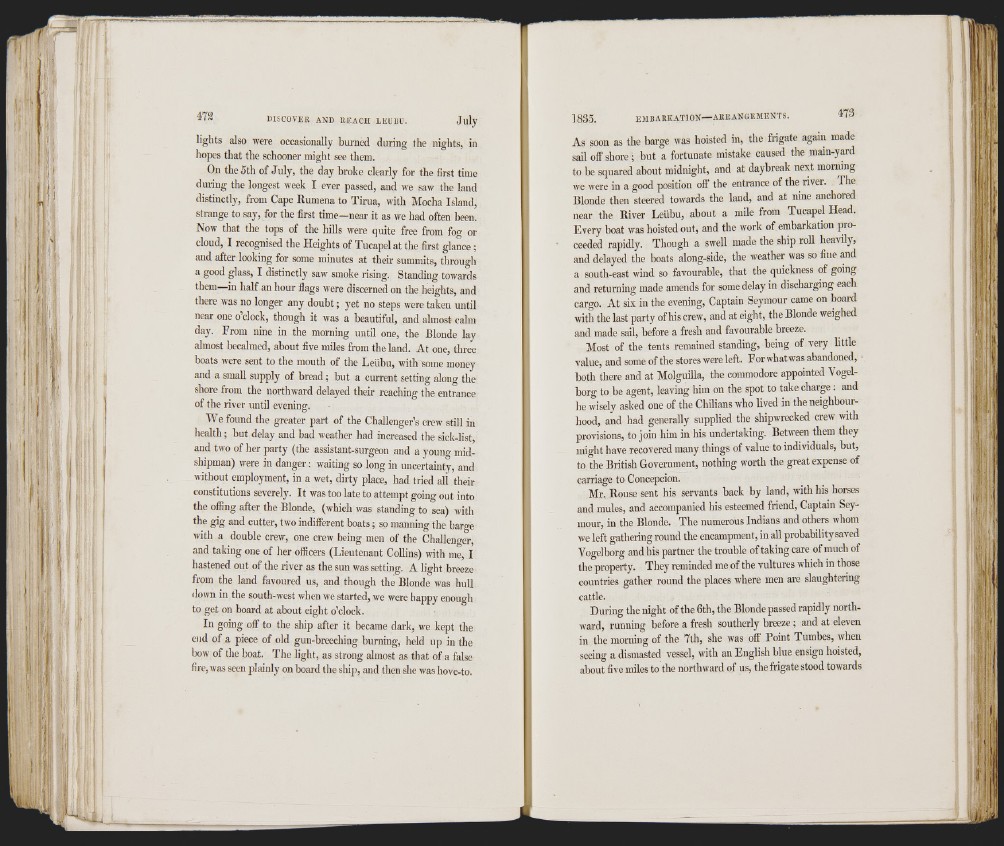
BISCOVEIl AND IIF.ACH LEUBU.
lights also were occasionally burned during the nights, in
hopes that the schooner might see them.
On the 5th of July, the day broke clearly for the first time
during the longest week I ever passed, and we saw the land
distinctly, from Cape Rumena to Tirua, with Mocha Island,
strange to say, for the first time—near it as we had often been.
Now that the tops of the hills were quite free from fog or
cloud, I recognised the Heights of Tucapel at the first glance ;
and after looking for some minutes at their summits, through
a good glass, I distinctly saw smoke rising. Standing towairis
them—in half an hour fiags were discerned on the heights, and
there was no longer any doubt; yet no steps were taken until
near one o’clock, though it was a beautiful, and almost calm
day. From nine in the morning until one, the Blonde lay
idmost becalmed, ahout five miles from the land. At one, three
boats were sent to the mouth of the Leübu, with some money
and a small supply of bread; but a current setting along the
shore from the northward delayed their reaching the entrance
of the river until evening.
We found the greater part of the Challenger’s crew still in
health; but delay and bad weather had increased the sick-list,
and two of her party (the assistant-surgeon and a young midshipman)
were in danger: waiting so long in uncertainty, and
without employment, in a wet, dirty place, had tried all their
constitutions severely. It was too late to attempt going out into
the offing after the Blonde, (whicli was standing to sea) with
the gig and cutter, two indiiferent boats; so manning the barge
with a double crew, one crew being men of the Challenger,
and taking one of her officers (Lieutenant Collins) with me, I
hastened out of the river as the sun was setting. A light breeze
from the land favoured us, and though the Blonde was hull
down in the south-west when we started, we were happy enough
to get on board at about eight o’clock.
In going off to the ship after it became dark, we kept the
end of a piece of old gun-breeching burning, held up in the
bow of the boat. The light, as strong almost as that of a false
fire, was seen plainly on board the shij), and then she was hove-to.
As soon as the barge was hoisted in, the frigate again made
sail off shore ; but a fortunate mistake caused the main-yard
to be squared about midnight, and at daybreak next morning
we were in a good position oft’ the entrance of the river. The
Blonde then steered towards the land, and at nine anchored
near the Biver Leübu, about a mile from Tucapel Head.
Lvery boat was hoisted out, and the work of embarkation proceeded
rapidly. Though a swell made the ship roll heavily,
and delayed the boats along-side, the weather was so fine and
a south-east wind so favourable, that the quickness of going
and returning made amends for some delay in discharging each
cargo. At six in the evening. Captain Seymour came on board
with the last party of his crew, and at eight, the Blonde weighed
and made sail, before a fresh and favourable breeze.
Most of the tents remained standing, being of very little
value, and some of the stores were left. For what was abandoned, ■
both there and at Molguilla, the commodore appointed Vogelborg
to be agent, leaving him on the spot to take charge : and
he wisely asked one of the Chilians who lived in the neighbourhood,
and had generally supplied the shipwrecked crew with
provisions, to join him in his undertaking. Between them they
might have recovered many things of value to individuals, but,
to the British Government, nothing worth the great expense of
carriage to Concepcion.
Mr. Rouse sent his servants back by land, with his horses
and mules, and accompanied his esteemed friend. Captain Seymour,
in the Blonde. The numerous Indians aud others whom
we left gathering round the encampment, in aU probability saved
Vogelborg and bis partner the trouble of taking care of much of
the property. They reminded me of the vultures which in those
countries gather round the places where men are slaughtering
cattle.
During the night of the 6th, the Blonde passed rapidly northward,
running before a fresh southerly breeze ; and at eleven
in the morning of the 7th, she was off Point Tumbes, when
seeing a dismasted vessel, with an Lnglish blue ensign hoisted,
about five miles to the northward of us, the frigate stood towards
■i l
4 lifl
ii Ú